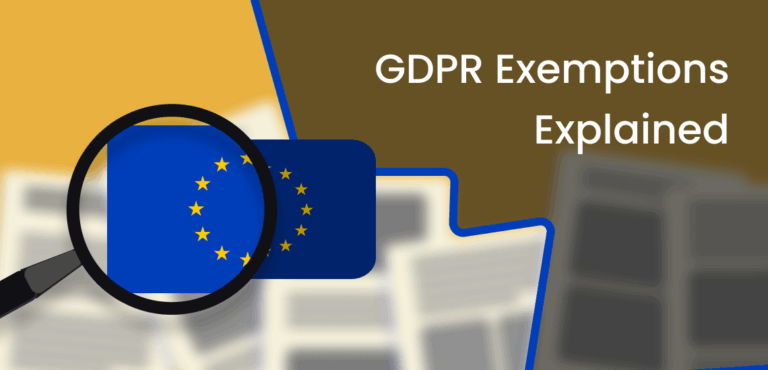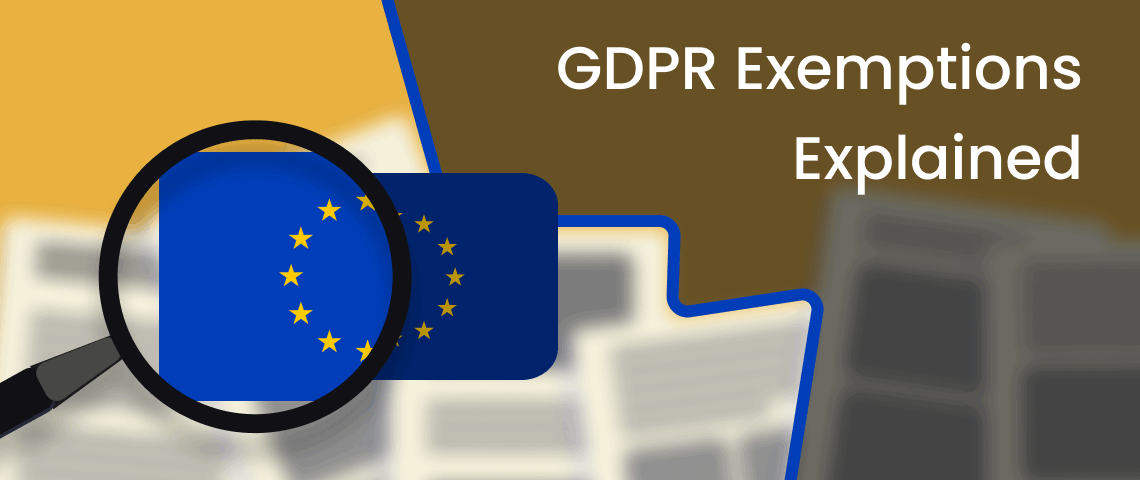Table of Contents
- 1. Personal or Household Activities
- Example:
- GDPR applies if:
- 2. Public Authorities: Criminal Law & National Security
- Covered under:
- Applies to:
- 3. Fully Anonymous Data
- Examples:
- Example:
- 5. Legal Claims and Proceedings
- Example:
- 6. Freedom of Expression and Journalism
- Applies to:
- 7. Activities Outside EU Law
- Final Takeaway

Since the General Data Protection Regulation (GDPR) came into effect in 2018, businesses processing personal data of EU residents have had to comply with one of the world’s most robust privacy laws. But what many don’t realize is that GDPR does not apply to every type of data processing.
There are specific exemptions – clearly outlined in the law where GDPR either doesn’t apply at all, or certain obligations are relaxed. Knowing these can save your business time, effort, and unnecessary compliance costs.
In this article, we’ll explain seven situations where GDPR does not apply or offers partial exemptions, with real-world examples and expert context.
1. Personal or Household Activities
If you’re processing data purely for private or personal use, GDPR won’t apply. This is referred to as the “household exemption.”
Example:
- Saving your contacts in a personal phonebook
- Posting holiday photos to a private group chat
GDPR applies if:
- You’re running a blog or YouTube channel with advertising
- You’re recording public spaces using home security systems
This exemption is only valid when the data is not being used for commercial, professional, or public-facing purposes.
2. Public Authorities: Criminal Law & National Security
GDPR does not apply to data processed by state authorities for law enforcement, national security, or defense.
Covered under:
- The Law Enforcement Directive (EU) 2016/680, not GDPR
Applies to:
- Police, courts, military, and national intelligence services
If you’re a private business offering security software or services, this does not exempt you from GDPR.
3. Fully Anonymous Data
If the data you collect is completely anonymized meaning it can no longer identify an individual, directly or indirectly then GDPR does not apply.
Examples:
- Aggregated statistics without any personal identifiers
- Non-identifiable data used in product usage analytics
Be cautious: pseudonymized data (data linked to a user ID or token) is still considered personal data under GDPR.
Reminder: According to GDPR Recital 26, if there’s any possibility of re-identifying the person, it’s not exempt.
4. Manual Data Not in a Filing System
GDPR applies to automated processing and manual data that forms part of a structured filing system. However, if manual data is truly unstructured, it may fall outside the scope.
Example:
- Random, handwritten notes on paper that are not sorted by name, date, or any identifier
This exemption is narrow, and in today’s digital-first world, it’s rarely applicable to online businesses.
5. Legal Claims and Proceedings
When personal data is processed specifically to establish, exercise, or defend legal rights, GDPR provides limited exemptions from some data subject rights (like the right to erasure).
Example:
- Retaining emails relevant to a legal dispute
- Withholding access to data if it compromises a legal case
Keep in mind: These exemptions do not allow unrestricted use of personal data—they apply only in the context of legal necessity.
6. Freedom of Expression and Journalism
To preserve the right to freedom of expression, GDPR allows EU Member States to make exemptions for journalistic, artistic, or academic content.
Applies to:
- News publications processing data in public interest
- Academic institutions publishing research involving personal data
Note: This exemption is defined differently in each EU country and must be balanced against privacy rights.
7. Activities Outside EU Law
Finally, GDPR does not apply to data processing that is entirely outside the scope of EU law—for example, matters of foreign policy or military operations managed by EU institutions.
This is rare in commercial business settings, but useful to understand for organizations operating in government, defense, or diplomacy.
Final Takeaway
GDPR is one of the most far-reaching privacy regulations in the world, but it’s not all-encompassing. Understanding when and where the law doesn’t apply helps businesses:
- Avoid unnecessary legal overhead
- Allocate resources to higher-risk processing
- Focus on real compliance risks
That said, if your business handles any form of user data for commercial purposes, GDPR likely applies and using a GDPR-compliant CMP remains a smart and scalable solution.

